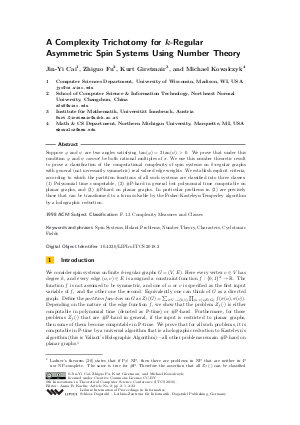A Complexity Trichotomy for k-Regular Asymmetric Spin Systems Using Number Theory
Authors Jin-Yi Cai, Zhiguo Fu, Kurt Girstmair, Michael Kowalczyk
-
Part of:
Volume:
9th Innovations in Theoretical Computer Science Conference (ITCS 2018)
Part of: Series: Leibniz International Proceedings in Informatics (LIPIcs)
Part of: Conference: Innovations in Theoretical Computer Science Conference (ITCS) - License:
 Creative Commons Attribution 3.0 Unported license
Creative Commons Attribution 3.0 Unported license
- Publication Date: 2018-01-12
File

PDF
LIPIcs.ITCS.2018.2.pdf
- Filesize: 0.55 MB
- 22 pages
Document Identifiers
Subject Classification
Keywords
- Spin Systems
- Holant Problems
- Number Theory
- Characters
- Cyclotomic Fields
Metrics
- Access Statistics
-
Total Accesses (updated on a weekly basis)
0Document
0Metadata
Abstract
Suppose \varphi and \psi are two angles satisfying \tan(\varphi) = 2 \tan(\psi) > 0. We prove that under this condition \varphi and \psi cannot be both rational multiples of \pi. We use this number theoretic result to prove a classification of the computational complexity of spin systems on k-regular graphs with general (not necessarily symmetric) real valued edge weights. We establish explicit criteria, according to which the partition functions of all such systems are classified into three classes: (1) Polynomial time computable, (2) \#P-hard in general but polynomial time computable on planar graphs, and (3) \#P-hard on planar graphs. In particular problems in (2) are precisely those that can be transformed to a form solvable by the Fisher-Kasteleyn-Temperley algorithm by a holographic reduction.
Cite As Get BibTex
Jin-Yi Cai, Zhiguo Fu, Kurt Girstmair, and Michael Kowalczyk. A Complexity Trichotomy for k-Regular Asymmetric Spin Systems Using Number Theory. In 9th Innovations in Theoretical Computer Science Conference (ITCS 2018). Leibniz International Proceedings in Informatics (LIPIcs), Volume 94, pp. 2:1-2:22, Schloss Dagstuhl – Leibniz-Zentrum für Informatik (2018)
https://doi.org/10.4230/LIPIcs.ITCS.2018.2
BibTex
@InProceedings{cai_et_al:LIPIcs.ITCS.2018.2,
author = {Cai, Jin-Yi and Fu, Zhiguo and Girstmair, Kurt and Kowalczyk, Michael},
title = {{A Complexity Trichotomy for k-Regular Asymmetric Spin Systems Using Number Theory}},
booktitle = {9th Innovations in Theoretical Computer Science Conference (ITCS 2018)},
pages = {2:1--2:22},
series = {Leibniz International Proceedings in Informatics (LIPIcs)},
ISBN = {978-3-95977-060-6},
ISSN = {1868-8969},
year = {2018},
volume = {94},
editor = {Karlin, Anna R.},
publisher = {Schloss Dagstuhl -- Leibniz-Zentrum f{\"u}r Informatik},
address = {Dagstuhl, Germany},
URL = {https://drops.dagstuhl.de/entities/document/10.4230/LIPIcs.ITCS.2018.2},
URN = {urn:nbn:de:0030-drops-83251},
doi = {10.4230/LIPIcs.ITCS.2018.2},
annote = {Keywords: Spin Systems, Holant Problems, Number Theory, Characters, Cyclotomic Fields}
}
